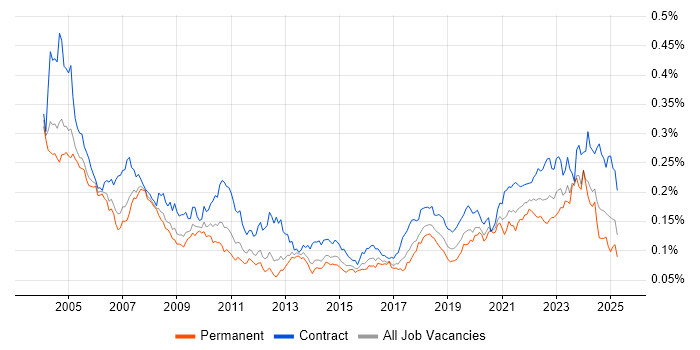VMS
UK
The table below provides summary statistics for permanent job vacancies requiring VMS skills. It includes a benchmarking guide to the annual salaries offered in vacancies that cited VMS over the 6 months leading up to 30 April 2025, comparing them to the same period in the previous two years.
| 6 months to 30 Apr 2025 |
Same period 2024 | Same period 2023 | |
|---|---|---|---|
| Rank | 628 | 628 | 789 |
| Rank change year-on-year | 0 | +161 | +142 |
| Permanent jobs citing VMS | 56 | 265 | 198 |
| As % of all permanent jobs advertised in the UK | 0.11% | 0.27% | 0.19% |
| As % of the Operating Systems category | 0.85% | 1.88% | 1.19% |
| Number of salaries quoted | 42 | 193 | 129 |
| 10th Percentile | £38,550 | £39,000 | £31,250 |
| 25th Percentile | £42,500 | £51,250 | £36,250 |
| Median annual salary (50th Percentile) | £61,250 | £57,500 | £47,500 |
| Median % change year-on-year | +6.52% | +21.05% | -31.65% |
| 75th Percentile | £71,250 | £61,250 | £67,500 |
| 90th Percentile | £88,750 | £73,750 | £80,000 |
| UK excluding London median annual salary | £47,500 | £57,500 | £49,750 |
| % change year-on-year | -17.39% | +15.58% | -19.76% |
All Operating Systems
UK
VMS falls under the Operating Systems category. For comparison with the information above, the following table provides summary statistics for all permanent job vacancies requiring operating system skills.
| Permanent vacancies with a requirement for operating system skills | 6,583 | 14,121 | 16,635 |
| As % of all permanent jobs advertised in the UK | 12.62% | 14.36% | 15.99% |
| Number of salaries quoted | 4,456 | 10,927 | 11,200 |
| 10th Percentile | £27,500 | £25,760 | £27,000 |
| 25th Percentile | £33,250 | £31,250 | £35,000 |
| Median annual salary (50th Percentile) | £47,500 | £45,000 | £52,500 |
| Median % change year-on-year | +5.56% | -14.29% | - |
| 75th Percentile | £67,500 | £62,500 | £71,250 |
| 90th Percentile | £85,625 | £80,000 | £92,500 |
| UK excluding London median annual salary | £42,000 | £42,500 | £45,000 |
| % change year-on-year | -1.18% | -5.56% | - |
VMS
Job Vacancy Trend
Job postings citing VMS as a proportion of all IT jobs advertised.

VMS
Salary Trend
3-month moving average salary quoted in jobs citing VMS.
VMS
Salary Histogram
Salary distribution for jobs citing VMS over the 6 months to 30 April 2025.
VMS
Top 15 Job Locations
The table below looks at the demand and provides a guide to the median salaries quoted in IT jobs citing VMS within the UK over the 6 months to 30 April 2025. The 'Rank Change' column provides an indication of the change in demand within each location based on the same 6 month period last year.
| Location | Rank Change on Same Period Last Year |
Matching Permanent IT Job Ads |
Median Salary Past 6 Months |
Median Salary % Change on Same Period Last Year |
Live Jobs |
|---|---|---|---|---|---|
| England | -3 | 45 | £65,000 | +13.04% | 67 |
| UK excluding London | +61 | 37 | £47,500 | -17.39% | 48 |
| Work from Home | +51 | 18 | £75,000 | +30.43% | 41 |
| London | +52 | 17 | £87,500 | +52.17% | 25 |
| South East | +75 | 8 | £52,500 | -8.70% | 17 |
| East of England | +52 | 8 | £45,000 | -21.74% | 11 |
| Scotland | +121 | 7 | £55,000 | -4.35% | 5 |
| Midlands | +37 | 6 | £80,000 | +39.13% | 4 |
| North of England | +36 | 5 | £67,500 | +17.39% | 9 |
| Yorkshire | +60 | 3 | £65,000 | +13.04% | 5 |
| West Midlands | +41 | 3 | - | - | 3 |
| East Midlands | +35 | 3 | £80,000 | +39.13% | 1 |
| Northern Ireland | +37 | 2 | - | - | |
| North West | 0 | 2 | £67,500 | +17.39% | 4 |
| Wales | +37 | 1 | £49,104 | +9.12% | 1 |
VMS
Co-occurring Skills and Capabilities by Category
The follow tables expand on the table above by listing co-occurrences grouped by category. The same employment type, locality and period is covered with up to 20 co-occurrences shown in each of the following categories:
|
|
||||||||||||||||||||||||||||||||||||||||||||||||||||||||||||||||||||||||||||||||||||||||||||||||||||||||||||||||||||||||||||||
|
|
||||||||||||||||||||||||||||||||||||||||||||||||||||||||||||||||||||||||||||||||||||||||||||||||||||||||||||||||||||||||||||||
|
|
||||||||||||||||||||||||||||||||||||||||||||||||||||||||||||||||||||||||||||||||||||||||||||||||||||||||||||||||||||||||||||||
|
|
||||||||||||||||||||||||||||||||||||||||||||||||||||||||||||||||||||||||||||||||||||||||||||||||||||||||||||||||||||||||||||||
|
|
||||||||||||||||||||||||||||||||||||||||||||||||||||||||||||||||||||||||||||||||||||||||||||||||||||||||||||||||||||||||||||||
|
|
||||||||||||||||||||||||||||||||||||||||||||||||||||||||||||||||||||||||||||||||||||||||||||||||||||||||||||||||||||||||||||||
|
|
||||||||||||||||||||||||||||||||||||||||||||||||||||||||||||||||||||||||||||||||||||||||||||||||||||||||||||||||||||||||||||||
|
|
||||||||||||||||||||||||||||||||||||||||||||||||||||||||||||||||||||||||||||||||||||||||||||||||||||||||||||||||||||||||||||||
|
|
||||||||||||||||||||||||||||||||||||||||||||||||||||||||||||||||||||||||||||||||||||||||||||||||||||||||||||||||||||||||||||||
